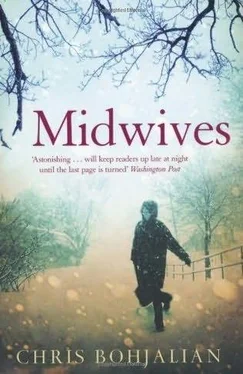Chris Bohjalian - Midwives
Здесь есть возможность читать онлайн «Chris Bohjalian - Midwives» весь текст электронной книги совершенно бесплатно (целиком полную версию без сокращений). В некоторых случаях можно слушать аудио, скачать через торрент в формате fb2 и присутствует краткое содержание. Жанр: Современная проза, на английском языке. Описание произведения, (предисловие) а так же отзывы посетителей доступны на портале библиотеки ЛибКат.
- Название:Midwives
- Автор:
- Жанр:
- Год:неизвестен
- ISBN:нет данных
- Рейтинг книги:5 / 5. Голосов: 1
-
Избранное:Добавить в избранное
- Отзывы:
-
Ваша оценка:
- 100
- 1
- 2
- 3
- 4
- 5
Midwives: краткое содержание, описание и аннотация
Предлагаем к чтению аннотацию, описание, краткое содержание или предисловие (зависит от того, что написал сам автор книги «Midwives»). Если вы не нашли необходимую информацию о книге — напишите в комментариях, мы постараемся отыскать её.
Midwives — читать онлайн бесплатно полную книгу (весь текст) целиком
Ниже представлен текст книги, разбитый по страницам. Система сохранения места последней прочитанной страницы, позволяет с удобством читать онлайн бесплатно книгу «Midwives», без необходимости каждый раз заново искать на чём Вы остановились. Поставьте закладку, и сможете в любой момент перейти на страницу, на которой закончили чтение.
Интервал:
Закладка:
He eyed my mother and then shook his head in disgust. My mother didn't flinch, but beside me my father did. He crossed and recrossed his legs.
"This crime is appalling on many levels, but you will find two especially galling: Charlotte Bedford would not have died in a hospital. This is clear. And Charlotte Bedford would not have died had she been cared for throughout her pregnancy by a physician. Obviously, Sibyl Danforth is not a doctor. She is a midwife. And while the women who call themselves midwives claim to have all sorts of arcane knowledge, while they claim to be able to deliver babies, in reality they know little more about medicine than you or I. Sibyl Danforth has never been to medical school. She has never been to nursing school. She does not have a license to practice medicine. In fact, she has so little medical training of any kind that between six and six-thirty on the morning of March fourteenth, she couldn't even tell the difference between a living woman and a dead one! Let's face it, Sibyl Danforth is no more certified to deliver babies than the woman at the stationery store who sold me my newspaper this morning, or the teenage boy who filled my car with gasoline!"
Tanner paused to let the vision grow real in the jurors' minds: a teenage boy with acne and a baseball cap and grubby hands delivering a baby.
In the momentary silence, however, I heard the sound of a baby about to nurse in the back of the courtroom, and I was glad. An adolescent grease monkey was a powerful image, but it seemed to me it paled before a nursing newborn. The little thing behind us cried briefly with hunger, then cooed when her mother opened her blouse and she saw the breast from which she was about to eat.
When Tanner resumed, he stood up straight and rested one hand on the rail of the witness stand, then empty. "The defense might insist that this trial is about the way the medical profession has stolen the process of birth from the women to whom it rightly belongs," he said, his voice growing more animated as he approached what I assumed would be a crescendo of sorts. "Well, that's hogwash. They might argue that this trial is about the right of pregnant women to choose to have their children at home. That's hogwash, too.
"This trial is about one thing, and one thing only: Sibyl Dan-forth's pattern of irresponsibility and misjudgment, a pattern that led inevitably to the mistake that cost Charlotte Bedford her life. The definition of involuntary manslaughter in Vermont is clear-you have heard it from the judge-and the case before you is a horrifying but altogether perfect example: Sibyl Danforth was grossly negligent. Sibyl Danforth engaged in conduct which involved a high degree of risk of death. And on the morning of March fourteenth, 1981, she indeed caused the death of Charlotte Fugett Bedford-as the statute says, 'another human being.'"
Tanner might have been about to say more, but the storm spared him the effort: Almost on cue, perhaps a second after quoting the statute, a gust of wind slammed the first sheet of rain into the picture windows behind him with such force that it sounded like thunder and shook the glass.
I was only one of many women and men in the courtroom who gasped.
At my high school, we were allowed to miss study hall up to three times a quarter if we had a valid excuse like a doctor's appointment or-apparently-the involuntary manslaughter trial of one's girlfriend's mother. By passing on the study hall before lunch and skipping the history class that came after, Tom was able to string together almost three consecutive hours to drive up to Newport and surprise the Danforth family as we emerged from the courthouse. My parents invited Tom to join us at a restaurant, but he had brought with him sandwiches and soda and a vision of an autumn picnic for two, and they let us go our own way for an hour.
"Just don't talk to any reporters," Stephen said to us as we left the adults. "Please. In fact, don't talk to anyone… please."
It was still pouring, so Tom and I ate our sandwiches in the front seat of the rusty Sunbird his older brother had finished repairing but would not be picked up by its owner until the end of the week. He had double-parked beside the Newport Library, an austere brick, almost imposing monolith across Main Street from the courthouse.
During most of our lunch we didn't speak of the trial, although I don't believe either of us was explicitly or consciously avoiding the subject. He'd asked how it was going as soon as we were seated in the automobile, and I'd told him what a mean son of a bitch Bill Tanner was, but then we'd moved on to other subjects: The fact that Sadie Demerest was going to break up with Roger Stearns. The fear we had that our football team would lose its first game that Friday night to St. Johnsbury, a much bigger school with, we had to assume, a much bigger and better team. The idea that Chip Reynolds was experimenting with the little tabs of acid his older brother was always bringing back from Montreal, and our firm belief that he was headed for trouble.
The rainstorm I'd watched that morning in the courtroom had come in from the north, and Tom told me of the armies of Canadian geese he'd seen flying south before it: I imagined great honking gray Vs in the sky, and in my mind I saw them flying overhead in wave after wave. He told me his uncle had gotten his first partridge of the year that day, a quick shot up on Gary Road just before breakfast, and he laughed at his uncle's pride in shooting a bird that "probably weighed about as much as a Snickers bar."
Before we parted, as I pushed the wax paper I'd crumpled into a ball into the bottom of my brown bag, I asked him if people in school were talking about the trial.
"I know one class, senior humanities, talked about it for a good forty-five minutes this morning. Made a lot of us wish we were a year older."
"You mean in class? They talked about it in class?"
"Honest to God. Garrett Atwood told me," he said, referring to a senior basketball player who was dating my precocious friend Rollie.
"And they were talking about the trial?"
"Not so much the trial," he said, pressing the smoldering tip of his cigarette into the ashtray, "as the way it's all so… so tragic. Mrs. Bedford being married to a minister and all."
I don't believe the word irony was a part of either of our working vocabularies back then, but I knew exactly what he meant.
"Did Garrett tell you how it ended?"
"I don't think the discussion really went anywhere, except a couple of girls ended up crying."
"For Mrs. Bedford? Or her husband?"
"Both. And for you and your mom."
"That's so sad."
"The whole thing's sad. Of course, Mr. Rhymer's a smart guy, and he kept everyone from getting hysterical. But Garrett said everybody still left feeling like this is one of those horrible things we're just not meant to understand."
"What about outside of class? Were people talking about it outside of class, too?"
"Well, yeah. Because you're not in school. But let's face it, if you were there, people would probably still be talking-just not when you were around," he added.
"What are they saying?"
He shrugged. "Oh, mostly that they think it's unfair what's going on. Most girls are saying they think it's A-OK to have a baby at home, and someday they probably will."
He didn't look at me as he spoke; he stared straight at the still-smoldering butt of his cigarette, and I knew instantly he was lying. I knew it with an intuitive, instinctive conviction. I knew, in fact, that exactly the opposite was true. The girls, when they spoke of me or my mother's situation at all, were sharing their fears about childbirth in general, and their astonishment that anyone would be stupid enough to try such a thing in their home.
"Like many midwives, she was probably viewed by the village with a mixture of awe and envy, fear and respect," Stephen said, referring to a late-eighteenth-century midwife whose diary he had studied. The woman had practiced in central New Hampshire, and her two-hundred-year-old diary had been discovered and published when I was in the sixth grade. Although I had not read the book, my mother and her midwife friends had, and the woman-Priscilla Mayhew of Fullerton-had become both a small saint and a large role model in their eyes.
Читать дальшеИнтервал:
Закладка:
Похожие книги на «Midwives»
Представляем Вашему вниманию похожие книги на «Midwives» списком для выбора. Мы отобрали схожую по названию и смыслу литературу в надежде предоставить читателям больше вариантов отыскать новые, интересные, ещё непрочитанные произведения.
Обсуждение, отзывы о книге «Midwives» и просто собственные мнения читателей. Оставьте ваши комментарии, напишите, что Вы думаете о произведении, его смысле или главных героях. Укажите что конкретно понравилось, а что нет, и почему Вы так считаете.











